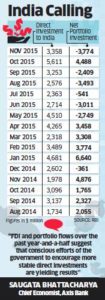
Private equity firms invested $23.8 billion across 591 deals in 2017, making it the biggest year for PE investments in India, says a report.
According to deal tracker Venture Intelligence, the investment value is 39 per cent higher than the previous high of $17.1 billion (recorded in 2015) and 55 per cent higher than $15.4 billion invested during 2016. In terms of number of deals the year 2017 saw 21 per cent less activity as compared to 2016 (731 deals), indicating large number of big-ticket transactions.
“The year witnessed 31 investment deals with size greater than USD 200 million, aggregating to $15.4 billion or 65 per cent of the total investments,” the report said. These figures include venture capital investments, but exclude PE investments in real estate.
In terms of industries, IT/ ITeS companies accounted for 45 per cent of the value pie attracting $10.7 billion worth investments across 325 transactions.
Flipkart received India’s largest ever PE investment of $2.5 billion in a single round from Softbank and another $1.4 billion from strategic investors Tencent, eBay and Microsoft. Softbank also invested $1.4 billion in mobile wallet and payments firm One97 Communications, which owns the Paytm brand. BFSI (Banking, Financial Services and Insurance) companies continued to enjoy the second spot attracting $4.40 billion across 61 transactions.
The sector was led by Bain Capital’s $1.04 billion investment in Axis Bank — the largest ever single investment in the sector — and Warburg Pincus’ $384 million pre-IPO investment in ICICI Lombard General Insurance.
On the back of its two mega bets (Flipkart and Paytm), Softbank emerged as the largest investor during the year with investments totaling over $4 billion (including a $250 million investment in Oyo Rooms).
Other top investors include Canadian pension fund CPPIB with $2 billion investments across five companies; while Warburg Pincus invested $1.6 billion across nine companies, and KKR invested about $680 million.
China’s Tencent emerged as a significant strategic investor in the Indian Internet and mobile sector with investment of $1.1 billion across home grown leaders like Flipkart, Ola, Byjus Classes and Practo.
Source: Business Standard



